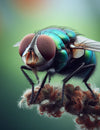
Having plants in our houses and offices is always peaceful and satisfactory. Moreover, having plants beside us during work always helps us relax and feel like we are always close to nature. But good things sometimes come with something terrible or irritating.
When some minor bug bothers your little plants, it irritates us too. Unfortunately, these creepy pests are bothersome for plants and become a barrier to plant growth, eradicating their beauty and, eventually, plants.
Some people even avoid bringing plants indoors because of these troublemaker pests and solutions as costly and toxic chemicals.
Pesticides are the only solution to put an end to these bugs. So yes, you are right. We have to use pesticides, but we don't need to buy pesticides that accommodate chemicals. Instead, we can use other approaches that will end bugs and not harm us.
Why are natural insecticides not chemical-based?
Some may know and don't know how powerful chemicals and insecticides are used to kill insects or pests. And who wants to spray these toxic pesticides in homes and offices? These poisonous chemicals put a question mark on not only our healthy life but also our pets and family.
These pesticides are available at a very high range, which not everyone can afford. And these chemicals can sometimes be risky for our plants' long life. But, on the other hand, many alternatives are available for these safe pesticides for our and our family's health, so why not use them?
(Related - Pest Control Exposure Effect on Human Health)
Homemade pesticides solutions
You might be thinking, what do you mean by homemade pesticides? It's simple as the name describes homemade pesticides as solutions made by an object present at our home that kill pests just as pesticides do. You can easily make your pesticides by using things present at your home.

(Related - What is natural pest control)
Soapy water spray
Soap kills pests when coming in contact with them. Soap spray is the cheapest and most effective way to kill these annoying bugs. Spraying soap water on plants will end aphids and mites by dehydrating them and is ultimately safer for your plants.
How to make soap spray
Dilute two tablespoons of mild liquid soap with 1 gallon of water. Spray the solution on infested plants. Use this solution every seventh day until the problem is completely gone.
Note: Do a spot test before spraying soapy water on the complete plant to see how the plant reacts against it.
Garlic and hot pepper spray
It might be the right choice if you are not allergic to a pungent smell. Garlic's strong smell halts aphides from eating on your lovely plant leaves and is not harmful to your plant.
How to make garlic and hot pepper spray
Put 2 to 3 garlic cloves and six large chilies in a blender and make a fine paste. Sieve the mixture and pour it into a spray bottle to spray on the plants.
Note: Make sure to do a spot test by spraying the mixture on a little spot to check how the plant reacts to the spray.
Essential oil as an insecticide for indoor plants
Essential oils are gaining popularity everywhere and now as insecticides too. Some essential oils work exceptionally as pesticides. Also necessary to have a fresh aroma of plants which is always so relaxing.
Eucalyptus essential oil
Eucalyptus essential oil has a minty smell, which works as a freshener for your office and home besides as a pesticide. Eucalyptus is the best option to protect your plants from wasps, bees, and flies.
How to make eucalyptus essential oil spray
The essential oil comes in a highly concentrated form. Only ½ teaspoon eucalyptus oil is enough for 500 ml water. Dilute ½ teaspoon of eucalyptus essential oil with 500 ml and spray the solution on affected plants. Use the solution every 7 to 14 days according to infestation until all bugs are gone.
Note: Try spraying this solution on a small part of the plant to test how the plant reacts to it.
Neem oil spray
Neem oil is entirely organic and made by plants using the distillation process and is as natural as diatomaceous earth. Neem oil effectively confuses bugs about eating or not and prevents them from reproducing and eventually killing them. It doesn't end insects immediately, but it takes time to terminate these annoying pests.
How to make neem oil spray
Dilute one tablespoon of neem oil in 1 liter of water, and spray it on plants. Pay this solution on leaves wisely. You can spray this solution every 15 days to get the best result. You can add mild liquid soap, too, in this spray.
Herbal water spray
Essential oils of sage, thyme, rosemary, mint, basil, and lavender, to name a few, works as excellent insect repellent. These essential oils are safe for your respiratory system and keep bugs away from your plant.
How to make herbal water spray
Dilute the little essential oil in water and fill it in a spray bottle to spray on the plants. Make sure to add very little essential oil (1/2 teaspoon in 500 ml for your idea) as they are the concentrated solution.
Note: Test the solution before applying it to know how the plant reacts to it, and do not spray too much.
Organic insecticide at store
If you have little time to make homemade solutions but looking for an organic solution, then this method is for you. As the trend towards using organic products keeps increasing, many organic treatments are also available at stores.
Pai's Plant Protector
Pai's plant protector is entirely organic and has a unique formula to protect your plant from insects and bugs. It covers the plant from aphids, snails, and all leave-eating insects.
How to use plant protector
It comes in powder form. You only need to sprinkle this powder on your plant, and then the plant protector will do the rest.
Besides using pesticides to protect your plant, you can also use good quality fertilizer (try Pai's Vermicompost) and soil booster to boost your plant's growth. And make sure to use good-quality soil to protect your plant from insects and bugs.





